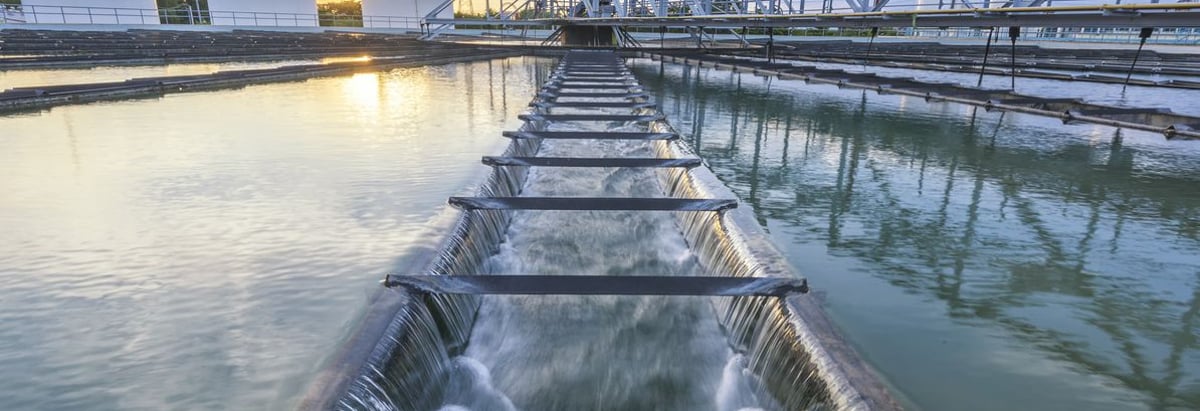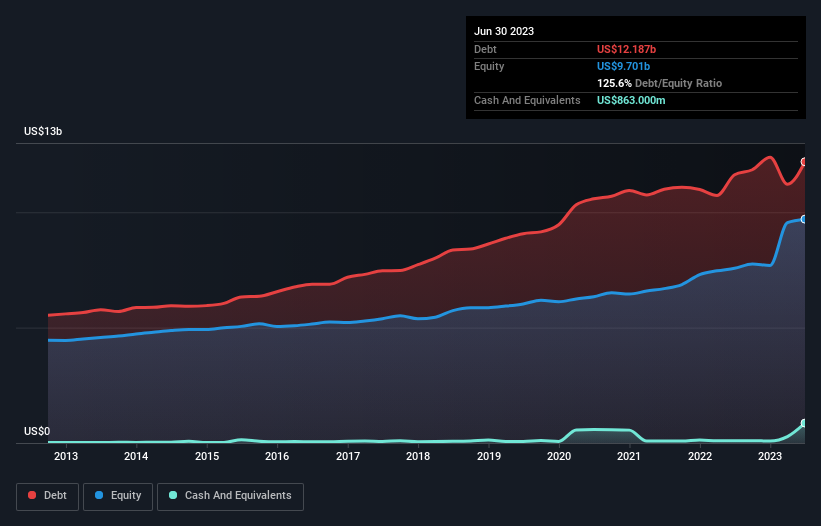- United States
- /
- Water Utilities
- /
- NYSE:AWK
These 4 Measures Indicate That American Water Works Company (NYSE:AWK) Is Using Debt Extensively

Warren Buffett famously said, 'Volatility is far from synonymous with risk.' When we think about how risky a company is, we always like to look at its use of debt, since debt overload can lead to ruin. We note that American Water Works Company, Inc. (NYSE:AWK) does have debt on its balance sheet. But the real question is whether this debt is making the company risky.
What Risk Does Debt Bring?
Generally speaking, debt only becomes a real problem when a company can't easily pay it off, either by raising capital or with its own cash flow. Part and parcel of capitalism is the process of 'creative destruction' where failed businesses are mercilessly liquidated by their bankers. However, a more common (but still painful) scenario is that it has to raise new equity capital at a low price, thus permanently diluting shareholders. By replacing dilution, though, debt can be an extremely good tool for businesses that need capital to invest in growth at high rates of return. The first thing to do when considering how much debt a business uses is to look at its cash and debt together.
See our latest analysis for American Water Works Company
What Is American Water Works Company's Net Debt?
You can click the graphic below for the historical numbers, but it shows that as of June 2023 American Water Works Company had US$12.2b of debt, an increase on US$11.6b, over one year. On the flip side, it has US$863.0m in cash leading to net debt of about US$11.3b.

How Strong Is American Water Works Company's Balance Sheet?
We can see from the most recent balance sheet that American Water Works Company had liabilities of US$1.76b falling due within a year, and liabilities of US$18.0b due beyond that. Offsetting these obligations, it had cash of US$863.0m as well as receivables valued at US$757.5m due within 12 months. So it has liabilities totalling US$18.2b more than its cash and near-term receivables, combined.
This deficit is considerable relative to its very significant market capitalization of US$25.7b, so it does suggest shareholders should keep an eye on American Water Works Company's use of debt. This suggests shareholders would be heavily diluted if the company needed to shore up its balance sheet in a hurry.
We use two main ratios to inform us about debt levels relative to earnings. The first is net debt divided by earnings before interest, tax, depreciation, and amortization (EBITDA), while the second is how many times its earnings before interest and tax (EBIT) covers its interest expense (or its interest cover, for short). Thus we consider debt relative to earnings both with and without depreciation and amortization expenses.
American Water Works Company has a rather high debt to EBITDA ratio of 5.3 which suggests a meaningful debt load. However, its interest coverage of 3.7 is reasonably strong, which is a good sign. However, one redeeming factor is that American Water Works Company grew its EBIT at 15% over the last 12 months, boosting its ability to handle its debt. There's no doubt that we learn most about debt from the balance sheet. But it is future earnings, more than anything, that will determine American Water Works Company's ability to maintain a healthy balance sheet going forward. So if you want to see what the professionals think, you might find this free report on analyst profit forecasts to be interesting.
Finally, a company can only pay off debt with cold hard cash, not accounting profits. So the logical step is to look at the proportion of that EBIT that is matched by actual free cash flow. During the last three years, American Water Works Company burned a lot of cash. While that may be a result of expenditure for growth, it does make the debt far more risky.
Our View
To be frank both American Water Works Company's net debt to EBITDA and its track record of converting EBIT to free cash flow make us rather uncomfortable with its debt levels. But on the bright side, its EBIT growth rate is a good sign, and makes us more optimistic. It's also worth noting that American Water Works Company is in the Water Utilities industry, which is often considered to be quite defensive. Once we consider all the factors above, together, it seems to us that American Water Works Company's debt is making it a bit risky. Some people like that sort of risk, but we're mindful of the potential pitfalls, so we'd probably prefer it carry less debt. The balance sheet is clearly the area to focus on when you are analysing debt. However, not all investment risk resides within the balance sheet - far from it. For instance, we've identified 4 warning signs for American Water Works Company (1 is a bit concerning) you should be aware of.
If you're interested in investing in businesses that can grow profits without the burden of debt, then check out this free list of growing businesses that have net cash on the balance sheet.
New: Manage All Your Stock Portfolios in One Place
We've created the ultimate portfolio companion for stock investors, and it's free.
• Connect an unlimited number of Portfolios and see your total in one currency
• Be alerted to new Warning Signs or Risks via email or mobile
• Track the Fair Value of your stocks
Have feedback on this article? Concerned about the content? Get in touch with us directly. Alternatively, email editorial-team (at) simplywallst.com.
This article by Simply Wall St is general in nature. We provide commentary based on historical data and analyst forecasts only using an unbiased methodology and our articles are not intended to be financial advice. It does not constitute a recommendation to buy or sell any stock, and does not take account of your objectives, or your financial situation. We aim to bring you long-term focused analysis driven by fundamental data. Note that our analysis may not factor in the latest price-sensitive company announcements or qualitative material. Simply Wall St has no position in any stocks mentioned.
About NYSE:AWK
American Water Works Company
Through its subsidiaries, provides water and wastewater services in the United States.
Average dividend payer with acceptable track record.
Similar Companies
Market Insights
Community Narratives



